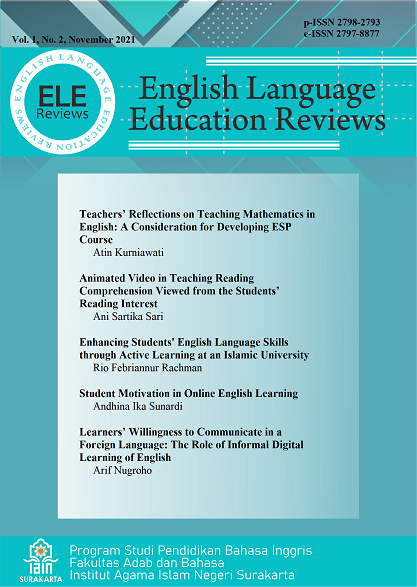Student Motivation in Online English Learning
DOI:
https://doi.org/10.22515/ele-reviews.v1i2.4034Keywords:
motivation, English learning, onlineAbstract
Downloads
References
Arikunto, S. (2015). Prosedur penelitian. Kencana.
Basar, A. M. (2021). Problematika pembelajaran jarak jauh pada masa pandemi COVID-19. Edunesia: Jurnal Ilmiah Pendidikan, 2(1), 208-218. https://doi.org/10.51276/edu.v2i1.112
Cahyono, A. D. (2020). Membangun komunikasi efektif dalam menentukan keberhasilan pembelajaran. http://p4tkboe.kemdikbud.go.id/bbppmpvboe/berita/detail/membangun-komunikasi-efektif-dalam-menentukan-keberhasilan-pembelajaran
Christian, Y., Robin, Aziz, M. F., Kencana, R. T., Exendy, R. R., Triputra, R., Tjiam, S., Rani, T., & Afnesia, U. (2020). Pembelajaran bahasa Inggris secara daring melalui youtube. National Conference for Community Service Project (NaCosPro), 2(1), 478-486. https://journal.uib.ac.id/index.php/nacospro/article/view/1217
Djamarah, S. B. dan A. Z. (2002). Strategi belajar mengajar. Rineka Cipta.
Fitriyani, Y., Fauzi, I., Sari, M. Z. (2020). Motivasi belajar mahasiswa pada pembelajaran daring selama pandemik COVID-19. Jurnal Kependidikan: Jurnal Hasil Penelitian Dan Kajian Kepustakaan Di Bidang Pendidikan, Pengajaran Dan Pembelajaran, 6(2), 165-175. https://doi.org/10.33394/jk.v6i2.2654
Halim, F. (2019). Penggunaan metode mind mapping sebagai upaya untuk meningkatkan kompetensi writing teks descriptive siswa pada MTsN Langsa. At-Tarbawi: Jurnal Pendidikan, Sosial dan Kebudayaan, 6(2), 188-201. https://doi.org/10.32505/tarbawi.v6i2.1281
Hamalik, O. (2014). Kurikulum dan pembelajaran. Bumi Aksara.
Jatmiko, H. T. P., Setiawan, B., & Sulistyo, E. T. (2017). Fungsi bahasa dalam wacana lisan transaksi jual beli di pasar Klewer Surakarta dan relevansinya sebagai materi pembelajaran bahasa Indonesia di SMA. Proceedings Education and Language International Conference, 359-375.
Jenkins, K. D. (2018). Understanding teacher beliefs and instructional decision making concerning disciplinary literacy: the case of secondary teachers in an urban school. International Journal of Learning, Teaching and Educational Research, 17(1), 175-196. https://doi.org/10.26803/ijlter.17.1.11
Keller, J. M. (1987). Development and use of the ARCS model of instructional design. Journal of Instructional Development, 10(3), 2. https://doi.org/10.1007/BF02905780
Kholid, I. (2017). Motivasi dalam pembelajaran bahasa asing. English Education: Jurnal Tadris Bahasa Inggris IAIN Raden Intan, 10(1), 61-71.
Long, C., Ming, Z., & Chen, L. (2013). The study of student motivation on English learning in junior middle school -- a case study of no.5 middle school in Gejiu. English Language Teaching, 6(9), 136-145. https://doi.org/10.5539/elt.v6n9p136
Mayasari, D. (2015). Pengaruh orientasi tujuan dan motivasi belajar terhadap prestasi belajar siswa SMA peserta bimbingan belajar LBB Primagama. UIN Syarif Hidayatullah Jakarta.
Mulyana, A. (2020). Motivasi belajar siswa, pengertian bentuk dan faktor yang mempengaruhi motivasi belajar siswa. https://ainamulyana.blogspot.com/2012/02/motivasi-belajar.html
Oktavia, I., Sukandi, P. I. I., Chalid, R. I., Selani, T. P., Kuntarto, E., & Noviyanti, S. (2018). Hakikat bahasa sebagai alat kontrol sosial. 1-9.
Oktiani, I. (2017). Kreativitas guru dalam meningkatkan motivasi belajar peserta didik. Jurnal Kependidikan, 5(2), 216-232. https://doi.org/10.24090/jk.v5i2.1939
Orgaz, F., Moral, S., & Domínguez, C. (2018). Student's attitude and perception with the use of technology in the university. Journal of Educational Psychology - Propositos y Representaciones, 6(2), 277-299.
Saragih, R. S. (2015). Kebutuhan komunikasi berbahasa Inggris. https://analisadaily.com/berita/arsip/2015/11/23/190828/kebutuhan-komunikasi-berbahasa-inggris/
Setiono, P., Dadi, S., Yuliantini, N., Anggraini, D., & Bengkulu, U. (2021). Analisis respon mahasiswa terhadap pelaksanaan pembelajaran daring. Jurnal Education and Development, 9(2), 19-23. https://doi.org/https://doi.org/10.37081/ed.v9i
Sugiyanto. (2012). Pentingnya motivasi berprestasi dalam mencapai keberhasilan akademik siswa. Universitas Negeri Yogyakarta, 1-15. http://universitas.widyamandala.ac.id/index.php?option=com_content&view=article&id=336:pentingnya-motivasi-berprestasi&catid=65:krida-rakyat
Suyanto, K. K. E.(2013). Hakikat pembelajaran bahasa Inggris untuk anak (EYL). English for Children (1-40). Universitas Terbuka. http://repository.ut.ac.id/id/eprint/3969
Trisnawati. (2008). Implementasi model ARCS (Attention, Relevance, Confidence, Satisfaction dalam pembelajaran PAI di SMA N 1 Brebes. IAIN Walisongo Semarang.
Uno, H. B. (2010). Teori motivasi dan pengukurannya. Bumi Aksara.
Yusril, F. P. (2019). Pemanfaatan teknologi informasi dalam bidang pendidikan (E-education). 2(1). https://doi.org/10.31219/osf.io/ycfa2
Downloads
Published
How to Cite
Issue
Section
Citation Check
License
Copyright (c) 2021 Andhina Ika Sunardi

This work is licensed under a Creative Commons Attribution-NonCommercial 4.0 International License.
Authors retain copyright and grant the journal right of first publication with the work simultaneously licensed under a Creative Commons Attribution License that allows others to share the work with an acknowledgement of the work's authorship and initial publication in this journal.
This ejournal system and its contents are licensed under
a Creative Commons Attribution-NonCommercial 4.0 International License








